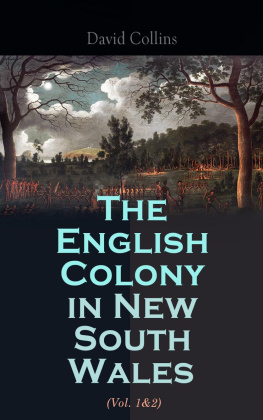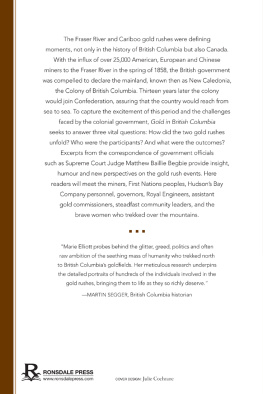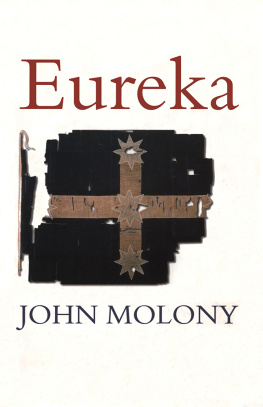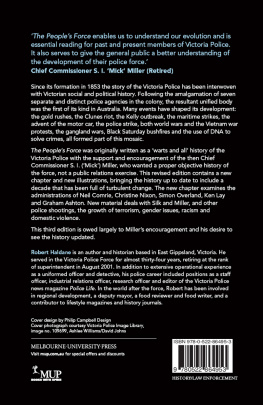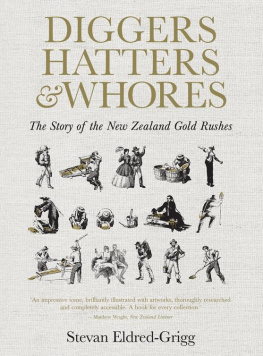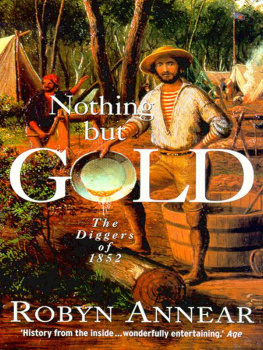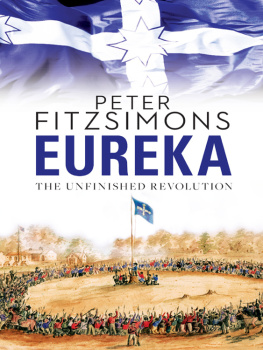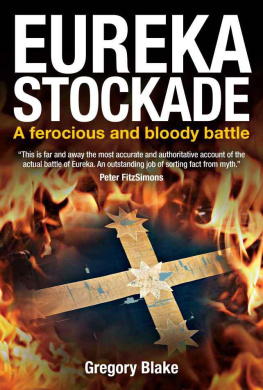Preface
I T has been my good fortune that Australian historians have singularly neglected the Victorian gold rushes, despite the colour and richness of the subject-matter and its importance. My original intention was to confine this study to the gold rushes, but I was led on to a general treatment of the period because consideration of the political outlook and economic fate of the diggers and of their impact on pastoral society raised such far-reaching questions. Happily, in the present state of knowledge of Australian history, there is a strong case for detailed study of the separate colonies. Only through this will their great degree of difference one from another and the difficulties of generalization about them in nineteenth-century Australia become fully apparent. I may perhaps be forgiven not starting at the beginning, in view of the existence of Margaret Kiddles superb Men of Yesterday and the detailed first volume of Gyles Turners History of the Colony of Victoria.
This is a long book, but one of its merits may be that it clears the ground for future work. In some respects the task of the general historian is unsatisfying: his range is so wide that few topics can be treated in depthonly the author can know how superficial much of his work necessarily is, and how often he has had time and space to tell only half the truth. I hope students will realize that scores of profitable research-topics in this period remain to be pursued, and that a wealth of material has been largely untapped.
I have many debts to acknowledge. I thank the officers of many libraries, particularly of the State Library of Victoria, who have done all those things which lead scholars to honour the librarians profession; the trustees of many libraries and several private owners for allowing me to make use of manuscripts and illustrations; the Nuffield Foundation, which made it possible for me to examine a wide range of material in the British Isles; my former teachers, Professors R. M. Crawford and Manning Clark; Professor J. A. La Nauze, who has set me the highest standards and has given generously of his time; the late Margaret Kiddle who, by her example, taught me much; my friends and colleaguesG. C. Blainey, C. B. Christesen, R. M. Hartwell, . A. R. Horn, G. F. James, J. D. Legge, A. W. Martin and P. A. Ryanwho have all helped to improve the book; many of my former students, notably Messrs R. J. Moore, G. R. Quaife and F. Strahan, whose research-work has been of great assistance; Miss J. Robinson, Dr L. Bodi, Dr . F. Kunz and Mr L. Fredman, who kindly supplied references and material; Mrs A. Morrison, Miss G. Williams and others who typed the manuscript; and I thank especially my wife Jessie.
G.S.
Monash University
A 2
Illustrations
Great meeting of gold diggers, 15 December 1851
1 Forest Creek, Mount Alexander
2 Charles Joseph La Trobe
3 John Pascoe Fawkner
(By courtesy of the Dixson Library, Sydney)
4 Sir William Beckett
5 Edward Wilson
6 Golden Point, Mount Alexander
7 Bushrangers on the St Kilda Road
(By courtesy of Lady Grimwade)
8 The Last of England
(By courtesy of the Birmingham Art Gallery)
9 The diggers give three groans for the Herald
(By courtesy of the National Library of Australia)
10 H. C. E. Childers, 1855
11 Sir Charles Hotham
12 Commissioners tent and officers quarters, Forest Creek, December 1851
13 Golden Point, Ballarat, 1851
14 Preparing to start
(By courtesy of Lady Grimwade )
15 Peter Lalor, 1855
16 W. F. Stawell, 1855
17 The government camp, Ballarat, 1854
18 Licence inspection
19 Melbourne Punch on Sir Charles Hothams governorship
20 Lieutenant-General Edward Macarthur, 1858
(By courtesy of the State Library of Victoria)
21 Andrew Clarke, 1855
22 The Eight-hours Day Committee, 1858
23 Group of miners in 1858
(By courtesy of the State Library of Victoria)
24 Puddling-tub
25 Horse puddling machine, Forest Creek
26 Wind-sails
27 Argus Flat Gold Mining Co. claim, Forest Creek, 1858
(By courtesy of the State Library of Victoria)
28 John OShanassy, 1858
(By courtesy of the State Library of Victoria)
29 William Clark Haines, 1858
(By courtesy of the State Library of Victoria)
30 Swanston Street, Melbourne, in 1856
(By courtesy of Lady Grimwade )
31 Toorak House
(By courtesy of Lady Grimwade)
32 George Higinbotham, c . 1860
33 Sir Henry Barkly, 1858
(By courtesy of the State Library of Victoria)
34 Ferdinand von Mueller, c . 1862
35 Bishop Charles Perry, 1858
(By courtesy of the State Library of Victoria)
36 John Alloos Chinese restaurant, Ballarat
(By courtesy of Lady Grimwade)
37 The public funeral of Burke and Wills, 21 January 1863
(By courtesy of the Royal Historical Society of Victoria)
Map of the colony of Victoria, 18511861
PROLOGUE The Port Phillip District in 1850
O n MONDAY 11 November 1850 a Port Melbourne publican galloped his coach over Princes Bridge and up Swanston Street blowing a trumpet, waving the Union Jack, and shouting, Hooray! Weve got separation at last! The Separation bill had been passed by the imperial parliament: the Port Phillip District was to be freed from the tyranny of New South Wales, and Her Majesty the Queen had graciously allowed her name to be conferred on the new colony.
The news had long been expected, and plans were well in hand for the five days celebrations that followed. The newspapers came out with headlines in monumental type, and did not appear again for six days. On the evening of the 13th there was a general illumination; almost every shop window carried emblems and decorations, blazing tar-barrels were rolled down Collins Street, and fireworks were prodigally expended, while the happy crowd sang and shouted itself hoarse. The morning of the next day, Thursday, was given to thanksgiving services, and the afternoon to sports and amusements; a Separation Anthem was sung with ragged gusto. Friday saw a great procession with the trades out in strength, the masonic and other lodges in all their regalia, the national societies, the military and the government officers, all cheering Superintendent La Trobe when he declared the new Princes Bridge formally open. Festivities tailed off over the weekend, to be revived again some nights later with the continental innovation of a fancy-dress ball. So, throughout the District, the news was celebrated of the foundation of the colony, which was not formally to be proclaimed for another seven months.
Port Phillip was prospering. This south-eastern corner of Australia, which made up less than three per cent of the continents area, extended 480 miles west from Cape Howe on the Pacific Ocean to the South Australian border, and between 130 and 280 miles north from Bass Strait to the Murray River. By Australian standards much of the District was fertile and well-watered, although it contained no rivers that were navigable for more than a few miles. The grassy and lightly timbered expanses of the central, and especially the south-western regions were ideal for pasturing sheep. In a mere sixteen years since the Hentys had settled at Portland, the population had grown to 77,000. The pioneers had quickly been followed by other enterprising pastoralists from Van Diemens Land who also ignored the law which placed the northern mainland out of bounds. Then a steady immigration had set in from over the Murray and from overseas. Woolgrowing was the foundation of the economy, the dominant activity by means of which nearly half the colonists made their living. Apart from the environs of the coastal towns and heavily timbered and mountainous country, almost the whole of the District was divided into nearly one thousand runs whose boundaries were unfenced and unsur-veyed. Wool and wool-products, worth almost 1 million a year, amounted to more than 90 per cent of Port Phillips exports. Six million sheepabout two-fifths of the Australian total and almost as many as in New South Wales propergrew about one-fifth of British imports of wool. The squatters themselves were generally men who had had some fair degree of education and standing in the home country; farmers sons predominated, but some were in a stricter sense gentlemen. There may have been as many Scots as Englishmen among themand most of the more successful ones were Scots. By 1850 those who had arrived by way of Van Diemens Land, together with the few remaining Overlanders, were outnumbered by those who had come direct from Britain. Nearly all worked their runs themselves, and few had leisure or security enough yet to take part in political affairs or to make the cultural contribution of which some were capable. Most still looked on the colony as a place of exile, lived for the day when they would have amassed enough to be able to return home, and were prepared to brush aside any obstacle to that goal. Most were unmarried and were debating whether they would run home for a wife or remain in the hope of being able to sell out soon and then return.




